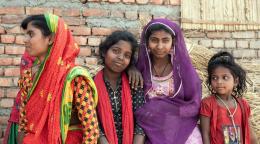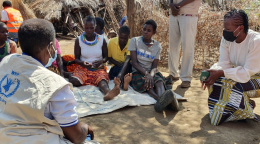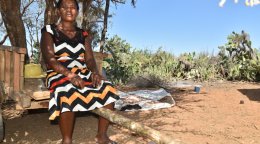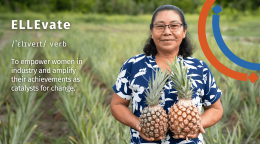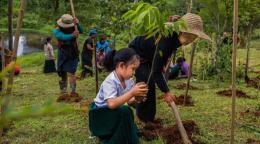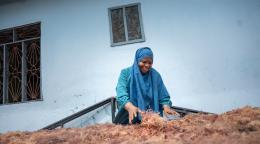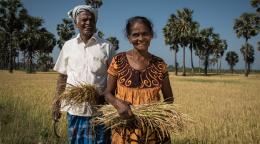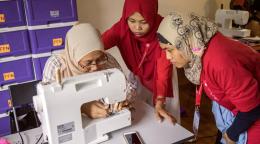Solidarity is key to accelerating tobacco control

The 2030 Agenda for Sustainable Development builds on Millennium Development Goal (MDG) priorities while setting the world’s sights on emerging health and development challenges. Tobacco control is among the greatest of these, as tobacco use is a major contributor to cardiovascular disease, cancer, diabetes and chronic respiratory illness – the four main non-communicable diseases (NCDs) that now account for the bulk of illness and deaths globally.
Tobacco use kills an estimated six million people annually and is also increasingly linked with the infectious diseases that continue to burden some developing countries, such as tuberculosis. But tobacco doesn’t just jeopardize health.
Rooted in social inequities, tobacco inflicts significant social, economic and environmental harm on individuals, families and national economies. Various forms of disadvantage – such as in education, income and ethnicity – tend to be associated with higher tobacco consumption. If current trends persist, deaths from tobacco are projected to double from 3.4 million to 6.8 million per year in lower and middle income countries over the 2002-2030 period.[1] By 2020, two thirds of the expected 7.5 million global deaths from tobacco use will occur among those in their economically productive middle years (35-69), with smoking rates projected to increase most rapidly among men in Africa and among both men and women in the eastern Mediterranean.[2]
Tobacco control and the SDGs
Tobacco control is addressed in the new Sustainable Development Goals (SDGs), notably Target 3a ‘Strengthen the implementation of the WHO Framework Convention on Tobacco Control (FCTC) in all countries as appropriate’. The SDGs are substantially broader, more integrated and more universally applicable than their predecessors, and the scope and ambition of the agenda presents substantial implementations challenges. Still, with 180 Parties having now committed to a common vision by ratifying the WHO FCTC, there is a major opportunity for countries to support each other by sharing resources, experiences and launching joint initiatives. This is precisely why the Agenda emphasizes a ‘revitalized global partnership’ for implementation, as captured under SDG-17.
Just two days after the UN General Assembly formally endorsed the SDGs this past September, UNDP and the Secretariat of the WHO FCTC convened 22 government delegations in Uruguay to chart out how they can harness south-south and triangular cooperation, or active solidarity between developing countries, to tackle tobacco – in effect leveraging Goal 17. Though not intended to be, the meeting can be called the first international gathering to operationalize the SDGs.
Cooperation to tackle tobacco
Tobacco control efforts have been ongoing for years. The 180 Parties to the WHO FCTC cannot, on their own, overcome all the implementation challenges they have singularly or collectively confronted. These include a lack of in-country technical expertise, coordination, misunderstanding of the whole-of-government response needed, scarce resources and threats of legal action from the tobacco industry.
At the meeting, countries that have put decades of research into developing concrete tobacco control policies – like the UK, France and Canada – shared what they have learned with developing nations. Developing nations at different stages of the tobacco epidemic and the tobacco control response also shared valuable insights and experiences. At the conclusion of the meeting, eight south-south cooperation projects were proposed, on topics ranging from graphical warnings on packages, to tobacco taxation, alternative livelihoods for tobacco growers, to strengthening countries’ capacities to withstand lawsuits and other forms of pernicious industry interference in policy-making.
The meeting was timely for the host country Uruguay. While the first day of the meeting in Montevideo was underway, Uruguay’s President, Tabaré Vazquez, stressed to the UN General Assembly in New York the need for countries to cooperate in their fight against NCDs. Vazquez specifically cited the lawsuit filed against his country by Philip Morris International, as an attempt to stifle and roll back proven public health measures like plain packaging of tobacco products. Indeed, Philip Morris and the larger tobacco companies see developing nations not as the future of global development progress but as emerging markets for their lethal products.
The peer learning (and peer pressure) that south-south cooperation generates is a highly effective tool for fighting back. While the 22 Parties now involved see their efforts as just the beginning, in the next 12 months they plan to have achieved some of their tobacco control objectives and to have strengthened their approach to south-south cooperation. This will ultimately lay a strong foundation for countries to combat tobacco use and reach the SDG targets – together.
[1] Putting noncommunicable diseases on the global agenda: NCD Alliance briefing paper: NCDs, Tobacco control, and the FCTC. NCD Alliance; 2011
[2] Bilano, V, et al. 2015. “Global trends and projections for tobacco use, 1990–2025: an analysis of smoking indicators from the WHO Comprehensive Information Systems for Tobacco Control.” Lancet, 385 (9972): 966-976.




